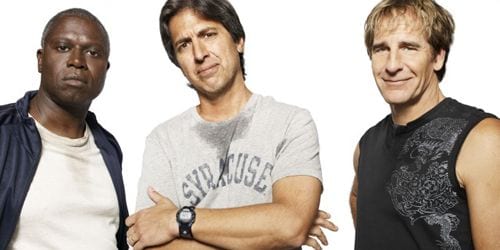
Early in the first episode of Men of a Certain Age, Joe (Ray Romano) sprawls open-eyed in the king-sized hotel room bed where he has taken refuge after his separation from his wife. He answers his wake-up call on the first ring and beats the anodyne voice on the other end to name the day of the week and the temperature. As he punches the air in triumph, we recognize both his loneliness and effort to keep control.
The show, developed and produced by Romano, introduces three college buddies who are still friends as they face 50. Love and rivalry keep these guys together as they confront the question of what to do now that they are grown up. They hang out at lunch, hike the local hills, and find in each other ways to maintain a little self-esteem. Owen (Andre Braugher) is a happily married father, and Terry (Scott Bakula), still single, enjoys the envy of his friends when he dates younger women. Joe has the security of running his own business, a party supply warehouse, and the real affection of his employees.
As one might expect from Romano, a fast moving mix of physical comedy and wry dialogue articulate this friendship, revealing its complexity and its depth. The guys touch on the mundane humiliations of maturity: bad driving, a lengthening list of medications, the obduracy of parents, and the disdain of the young. When Terry tries to pick up the barista at his local coffee shop, she wonders silkily whether her midnight shift end will prove too late for him to head out on a date. Owen’s big lunches leave him sleepy and lethargic at work, eliciting disdain from his father and boss (a forbidding Richard Gant), while Joe can’t decide whether being separated means he needs to date other women.
In the phrase made famous in Seinfeld, Men is “a show about nothing.” But the superb casting and acting, and the courageous writing that strips the three main characters bare, make it seem to encompass everything. Braugher has struggled since Homicide: Life on the Streets to find a medium or character in which he might excel. In Owen, he coruscates in this most unheroic of roles, an overweight, insulin-injecting diabetic, crushed between his domineering father and a family lifestyle he cannot afford, locked in a job where he makes not-quite-enough money only by persuading people to spend far more than they can possibly afford.
Most striking, though, is Braugher’s generosity as a seasoned ensemble player and the ability of both Romano and Bakula to match his risk-taking in the service of character. In Everyone Loves Raymond, Romano’s thwarted agency and quotidian goofiness were appealing; in Men, he reworks the same qualities with such an edge that he might as easily pick up a gun and spray his party store with bullets as while away his underemployed working hours with the club and balls that recall his abandoned aspirations to join the pro golf tour.
Terry’s concerns are equally complicated. He might be muscular and fit. He might have scored in the past a few bit parts and commercials, enough to pull the odd “Don’t I know you?” response that visibly feeds his ego. But the minute he relaxes, gravity takes over, and viewers glimpse the deeply lined, jowly countenance that he will soon no longer be able to hide. When Terry proclaims, “Age is only a number,” Bakula conveys beautifully both the flippant bravado and the self-knowledge behind such a claim.
The show’s emotional register oscillates between empathy and shock at the men’s psychological nakedness. A standard guys-watching-sports sequence in the third episode starts in envious admiration of Owen’s new wall-mounted TV. But when he flips the station from the game they’ve been watching, and ignores Joe’s increasingly agitated entreaties to turn it back on, Terry and Owen twig that Joe has started gambling again.
As they attempt to reason with him, he brushes them off, intent on forcing Owen to turn the game back on. Suddenly tired of his friend’s agitation, and his own cruelty, Owen restores the closing moments of the game. At his team’s triumph, Joe leaps to his feet, greed naked on his face. As he punches a kids’ toy, his joy turns to anger, until the thing collapses with a desiccated hiss, and he turns to his astonished friends, awkward and ashamed. The scene concisely and bravely confronts the running anger — at self, fate, bad decisions, and lost opportunities — that haunts the prosperous middle classes of the West, where plenty is never enough and contentment’s a forgotten art.
As in life, so in Men, tension might relax into a corny joke or explode into a white-hot maelstrom at a careless word or an unguarded tone. The plight of the male divorced from his aspirations through his pusillanimity was a signature theme of American literature in the second half of the 20th century. The show translates that threnody into the sterile materialism of the 21st, where affectless suburbia and pointless consumption (party balloons, shiny cars, and the narcissistic tending of the ageing body) swamp eros and energy. Here the American Empire has fizzled out with a whimper, and men must learn to live in its ruins.

![Call for Papers: All Things Reconsidered [MUSIC] May-August 2024](https://www.popmatters.com/wp-content/uploads/2024/04/all-things-reconsidered-call-music-may-2024-720x380.jpg)



